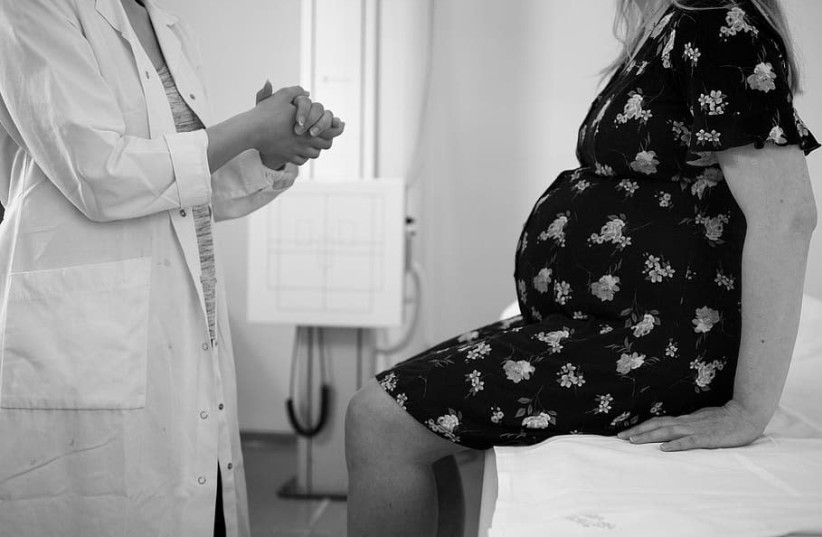Barren, the first feature by Mordechai Vardi, is a graceful, compelling look at a young ultra-Orthodox couple in Safed, as they suffer and work through a trauma. Beautifully photographed and acted, it presents the society in which the couple lives as complex and multifaceted, in contrast to the often-used approach that portrays religious life as uniformly repressive and the secular world as unironically positive.
This more nuanced approach should come as no surprise if you know Vardi’s background, which is unusual for a debut feature filmmaker, to say the least. Vardi is a rabbi who has been the head of the screenwriting department at the Maaleh School of Film and Television in Jerusalem for decades, and he has a degree in film from Tel Aviv University in addition to his rabbinic ordination. Vardi has made a number of documentaries that deal with how the religious world copes with difficult issues, such as the way LGBT people are often pressured into marrying against their own sexual orientation in order to obey religious laws; mental illness; and the children of parents who became religious and have a hard time trying to share their parents’ religious faith. He has also made a documentary, The Field, which looks at a Palestinian peace activist in the West Bank.
But you do not need to know anything about Vardi’s biography to appreciate and enjoy Barren, which centers on Faigi (Mili Eshet), a young married woman who works in a Judaica shop in Safed, who has been married for four years but has not gotten pregnant. She and her husband, Naftali (Yoav Rotman) are anxious for a child but have chosen not to get fertility treatments, preferring to put their faith in prayer.
They have a warm relationship and are obviously enjoying their sex life but they are increasingly worried. Naftali’s way of coping with their problem is to take a trip to Uman for Rosh Hashana to pray at Rabbi Nachman’s tomb.
The couple lives with his parents, whom Faigi feels are judging her, and she is not looking forward to being alone with them over the holiday, but she understands her husband’s desire to make this pilgrimage. The movie is very sensitive in its depiction of the conflict between Faigi and her in-laws, played by Ilanit Ben-Yaakov and Nevo Kimchi, especially with her mother-in-law, who truly seems to care for her.

The film's twists and turns
THE YOUNG couple live with his parents and Faigi longs for independence and privacy, and often misinterprets her mother-in-law’s words as criticism, as so often happens in close families. The parents were secular and embraced ultra-Orthodoxy, but Faigi and Naftali are more fully integrated into the ultra-Orthodox world. Faigi’s parents live in America and she misses them and feels isolated. Faigi lives in a world where her status as a married woman without a child is considered a problem by everyone she meets. The attendant at the mikveh she visits every month urges her to seek medical treatment but she does not follow this advice.
When Naftali’s father brings home Rabbi Eliyahu (Gil Frank) for the holiday, the movie takes a dark turn. This rabbi claims to have healing powers that can to help with the couple’s infertility. He speaks in a charismatic way to the troubled young wife, who has been conditioned to obey powerful men and to believe in spiritual healing more than what the medical establishment has to offer. As we know all too well from the news, predators can easily exploit the faith and docility of women like Faigi, and a tragedy that is both familiar and unique plays out in the rest of the film.
There is an implicit critique here of the fact that ultimately Faigi’s life is arbitrated by a group of male rabbis, whom she chooses to obey. But Barren breaks with stereotypes by showing the obvious truth that rabbis often disagree, that they are not all of a piece, although this distinction will be lost on many who see it in the secular world, who will simply be revolted by their power over her. In any case, the resolution of Faigi’s story is gripping.
While the quality of the script should come as no surprise, given Vardi’s experience as a screenwriting teacher, his work with the actors is outstanding. The film is impeccably cast, from the main actors down to the supporting characters, such as Henry David and Yana Yossef as a young, newly religious couple the mother-in-law counsels as a matchmaker. Ilanit Bar-Yaakov is commanding, and you can see how her character would intimidate a daughter-in-law.
The central character is Faigi and Mili Eshet, an extremely appealing and gifted actress, gives a wonderful performance. Eshet made a big impression in her first leading role in a feature film, Eran Kolirin’s Beyond the Mountains and Hills in 2016 and I’ve been waiting for her to appear in a new film ever since. She has an expressive face the camera loves, topped by a mane of frizzy hair, the kind that it is a terrible mistake to try and straighten, and I hope to see more of her.
Barren is a memorable movie and presents characters you believe in and care about, as it gives moviegoers a look and insights into a way of life that some will find fascinating and others off-putting.
